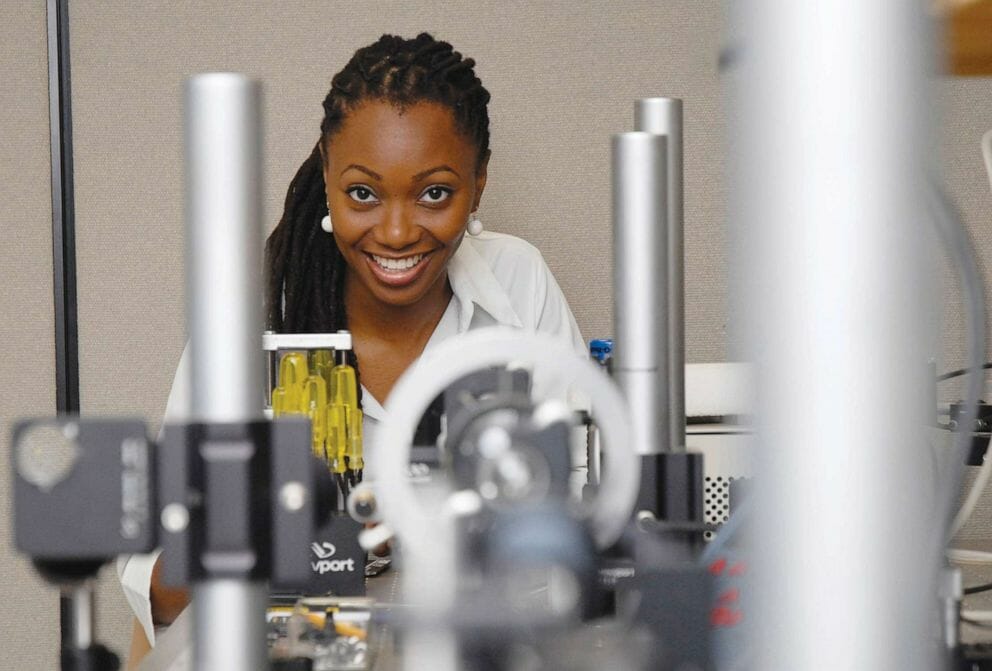Hadiyah-Nicole Green is an African American physicist known for her groundbreaking development of a method using laser-activated nanoparticles for potential cancer treatment. Born in Huntsville, Alabama, she was the first member of her family to graduate from college when she earned her Bachelor of Science in physics from Alabama Agricultural and Mechanical University and majored in Optics and a minor in Mathematics in 2003.
Hadiyah-Nicole went on to earn a Masters in Physics in 2009 followed with her Ph.D. in physics from The University of Alabama at Birmingham in 2012, becoming one of only 66 black women to earn a Ph.D. in physics in the United States between 1973 and 2012. In 2008, she became the first person to provide experimental evidence that nanoparticles can be used to destroy cancer cells without harming healthy cells, and she has continued to develop this technology as a potential cancer treatment. She is currently an associate professor at the University of California, Los Angeles, and her work has been featured in Time magazine, Popular Science, and National Geographic.

After graduation from Alabama A&M, Ora Lee Smith, her aunt who stepped in to raise her after the death of her parents was diagnosed with female reproductive cancer. Because of the side effects of chemotherapy and radiation, Ora Lee chose not to use the treatment. Hadiyah was there for her aunt until she passed away in 2005. After her aunt, her uncle Lee Smith, was also diagnosed with cancer, but her uncle decided to use chemotherapy and passed away three months later. While attending to Lee Smith, Green watched as her uncle suffered from chemotherapy side effects and the radiation associated with it. Hadiyah soon realised that comparing her aunt who refused chemotherapy and her uncle who did not, her uncle seemed a little better than what her aunt went through. This made her to set her effort towards the development new cancer treatments.
Cancer is one of the leading causes of death worldwide, and traditional treatments like surgery, radiation, and chemotherapy can often be as harmful to healthy cells as they are to cancerous ones. That’s why Green decided to focus her research on finding new ways to target cancer cells without harming healthy cells. She realized that lasers could be a key component in this effort. By using lasers to “illuminate” nanoparticles, she was able to create an image of cancerous cells and significantly decrease the amount of time it took to target these cells. Green’s research has the potential to revolutionize cancer treatment and save countless lives.
African Giant Dr. Hadiyah’s groundbreaking research has the potential to revolutionize cancer treatment. She first tested her ideas with cancer cells in a petri dish before moving to small animal models such as mice. The next phase of her research efforts seek to extend this nanoparticle treatment to humans. If successful, this novel approach could provide a more targeted and effective way to treat cancer, with fewer side effects than current treatments. This could lead to a significant improvement in the quality of life for cancer patients around the world.
It was no surprise when, after completing her undergraduate studies at Tuskegee University, she went on to join the faculty as an assistant professor in the Department of Material Science and Engineering. Green’s fascination with the potential of lasers led her to apply for a grant from the Veterans Affairs Historically Black Colleges and Universities Research Scientist Training Program. She was awarded $1.1 million, which she used to advance her research into using lasers for medical applications. Thanks to Green’s pioneering work, lasers are now being used more and more frequently in surgery, with potentially life-saving results.
The African Giant has furthered her work through the creation of an NGO; Green founded the Ora Lee Smith Foundation in 2016, named after her aunt with the sole aim of taking the treatment of Cancer to a whole new level and making it more effective with little or no side effect. The foundation also aims to make such treatment cheaper and much more affordable.










